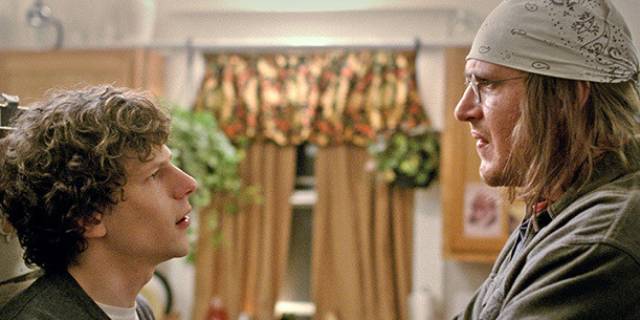
 Based on David Lipsky’s memoir, The End of the Tour chronicles Rolling Stone writer Lipsky’s (Jesse Eisenberg) conversations with David Foster Wallace (Jason Segel) during the final leg of the book tour for his one thousand page masterpiece novel, Infinite Jest. As with director James Ponsoldt’s previous work, the film is also a character focused drama, only this time placing the spotlight on the pathos of the writer. David Lipsky begins his profile very intimidated by the enigmatic David Foster Wallace. He just had his own novel published, yet to drastically less fanfare, and is quite transparent in his envy of the instant fame that Infinite Jest has awarded its author. Expecting to meet a writer embracing his newfound relevance, he’s instead met with someone who would much rather be left alone in his isolated home with his two dogs. As the interview rolls on and the men spend more time with each other, Lipsky grows further more suspect of Wallace’s sincerity.
Based on David Lipsky’s memoir, The End of the Tour chronicles Rolling Stone writer Lipsky’s (Jesse Eisenberg) conversations with David Foster Wallace (Jason Segel) during the final leg of the book tour for his one thousand page masterpiece novel, Infinite Jest. As with director James Ponsoldt’s previous work, the film is also a character focused drama, only this time placing the spotlight on the pathos of the writer. David Lipsky begins his profile very intimidated by the enigmatic David Foster Wallace. He just had his own novel published, yet to drastically less fanfare, and is quite transparent in his envy of the instant fame that Infinite Jest has awarded its author. Expecting to meet a writer embracing his newfound relevance, he’s instead met with someone who would much rather be left alone in his isolated home with his two dogs. As the interview rolls on and the men spend more time with each other, Lipsky grows further more suspect of Wallace’s sincerity.
Donald Margulies' contained screenplay is rich with fascinating dialogue that shows the unique mind and profound wisdom of Wallace. Structured around scenes featuring key exchanges between the two writers taking place throughout their road trip, so much of the fun is derived from watching these two minds battle wits. Jesse Eisenberg is in top form but it’s Jason Segel who steals the show, playing against type in the first true showcase of his dramatic talents. Segel completely transforms, capturing the embattled nature of a brilliant man haunted by his own imperfections. Longing to be understood, it’s heartbreaking to watch his pain when Lipsky pries with questions about his depression and supposed controversial past. His cadence becoming almost child-like with disappointment, it’s clear that whether his responses are truthful or not, he’s feeling the sting of betrayal from a person who represents possible friendship.
Equal parts comedic and tragic, the film makes up for its lack of action with sure-handed direction and immensely engaging performances. Providing excellent commentary on media, fame and expectations, The End of the Tour is a pensive and insightful portrait of two writers fighting for their ideal version of success. Interestingly, the film begins with Lipsky watching the news report of Wallace’s death and then travels back to when he first requests the assignment. By immediately moving past the death, James Ponsoldt communicates to his audience that the film is not about how Wallace met his demise but a tribute to an incredible mind and a very human being.